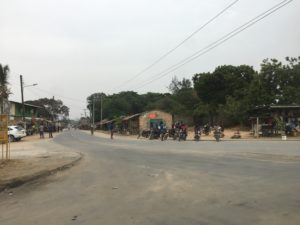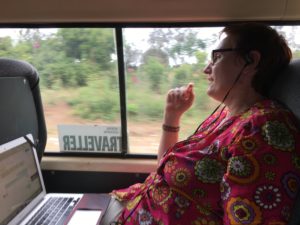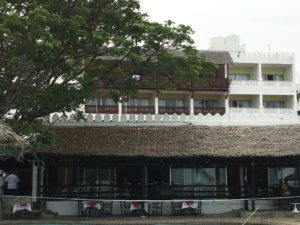Up in the dark at 5:30 AM and prepared to depart by 6 AM on the 2+ hour drive to Mombasa where we were to have a meeting with about 20 women peacebuilders from the Mombasa/Coastal area. After spending a good deal of time bouncing our way north on an unpaved, rocky road with arid, rocky land that reminded me of Palestine/Israel stretching out to the east and west, we reached blacktop, which lasted the rest of the way to Mombasa.
 Once we were out of the resort area south of Malindi, the housing we passed by was a mix of most basic – stick frames filled in (usually only partially) with mud bricks, with thatched roofs, more substantial – stone and mortar walls, with either thatched or corrugated tins rooks, most developed – stucco walls, often brightly painted with substantial roofs.
Once we were out of the resort area south of Malindi, the housing we passed by was a mix of most basic – stick frames filled in (usually only partially) with mud bricks, with thatched roofs, more substantial – stone and mortar walls, with either thatched or corrugated tins rooks, most developed – stucco walls, often brightly painted with substantial roofs.
So much life is lived, so much business conducted in the usually narrow borders of bare dirt, dotted with trees, between the road and the dwellings/stalls/shops. The few open-air markets we passed by seemed to be populated entirely by women. Clearly an important gathering and socializing center; also an essential source of livelihood for those who sold and of the basic necessities of life for those who bought.
Often you see clusters of young men gathered beside the road. It’s troubling to wonder what life has to offer them at this stage of their development into adulthood. What sort of present and future do they life and/or imagine? It strikes me is it a substantial challenge to Kenya and many other countries in Africa to provide pathways into positive, meaningful engagement in their lives for their young men and pathways beyond the kitchen, the farm, the market for young women. Seeing groups of children walking to and from school, I found myself wondering what future awaited them. The answers to that question should be of concern to the entire world.
Along the way, we drove through a significant stretch of road with an enormous sisal plantation on both sides of the road. The name “Vipingo” was everywhere – including on an elementary school and a Muslim secondary school. The sisal plants look as though they must somehow be related to pineapples, but their stringy fiber is used to make fabric, rugs and ropes. We also went through a stretch where it seemed to me as though mosques on the west side of the road and churches on the east alternated with each other – fairly near neighbors but on opposite sides of the road.
 Along the way, I had the privilege of learning a little more about Angi’s path to this point in her life. She grew up in a Mennonite community in Iowa with an inquisitive mind, a strong sense of justice and a love of learning. Through and after college, her life became global – Nicaragua, Germany; her first post-college work was in the Balkans. She then accepted a post in remote Kailahun in immediately post-civil war Sierra Leone and then moved to Kenya, where she has lived for a decade, doing extensive work in Kenya, Somalia and South Sudan.
Along the way, I had the privilege of learning a little more about Angi’s path to this point in her life. She grew up in a Mennonite community in Iowa with an inquisitive mind, a strong sense of justice and a love of learning. Through and after college, her life became global – Nicaragua, Germany; her first post-college work was in the Balkans. She then accepted a post in remote Kailahun in immediately post-civil war Sierra Leone and then moved to Kenya, where she has lived for a decade, doing extensive work in Kenya, Somalia and South Sudan.
Along the way, her focus on peacebuilding in diverse settings has led her to a belief that trauma healing is essential foundational work for meaningful peacebuilding. Trauma healing became the founding focus of the Green String Network. She is an impressive, always working, woman with the amazing capacity to write on a computer, answer emails and texts, and engage in calls while bouncing in the back seat of a van rattling at constantly changing speeds down the road. Not surprisingly, GSN is a remarkable organization. We at Catalyst are privileged to be in relationship with them.
As we neared Mombasa, the traffic slowed nearly to a creep. When we had dinner with Angi’s family on Monday night, her husband, Maina, who runs a small, fully natural dairy business, explained that as each successive generation passed away, their heirs inherited land that was then subdivided into smaller and smaller plots. So, many formerly agricultural plots have now gotten so small that they barely accommodate a dwelling space.
As a result, the country has lost/is losing a substantial amount of agricultural land and more and more people are being forced into the cities. Nairobi’s population is now greater that 7 million. The infrastructure, most visibly the transportation infrastructure, has failed to keep pace with this rapid growth. Because of this, in the major cities in Kenya (Mombasa is the second largest), at peak traffic hours, which can seem to last a good part of the day, a 20 minute drive can become a 90-120 minute drive.
 Fortunately and intentionally, the Bamburi Beach Hotel where we were meeting is on the southern edge of Mombassa, so we didn’t have creep along for too long before we pulled into the driveway leading through the security barricade that opened into the hotel registration and parking area. We found our way to our meeting room – an upstairs space, with a small window, set up with rows of tables that we quickly moved against the wall so we could create a circle of chairs – and were soon talking with the women as they arrived.
Fortunately and intentionally, the Bamburi Beach Hotel where we were meeting is on the southern edge of Mombassa, so we didn’t have creep along for too long before we pulled into the driveway leading through the security barricade that opened into the hotel registration and parking area. We found our way to our meeting room – an upstairs space, with a small window, set up with rows of tables that we quickly moved against the wall so we could create a circle of chairs – and were soon talking with the women as they arrived.
The woman who was instrumental in arranging the meeting mentioned in passing that she has just been diagnosed with Dengue fever! And, yet, here she was, greeting everyone who arrived with a gracious, warm smile. That, in itself, models something precious and powerful about women’s leadership. One of the first things I learned from her is that this part of Kenya is generally regarded as peaceful and its people are seen as happy and easy-going, with an always-ready warm smile. And, that has changed over the past five years with the increasing presence and menace of Al Shabab and ISIS. Behind our smiles, she noted, we have great sadness. We carry heavy burdens.
The group of women that gathered seemed fairly evenly divided between Muslims and Christians, and from younger to middle-aged. The elders in the group, the pioneer women peacebuilders in this part of the country, are clearly revered. Many of the women already knew each other and fell into easy conversation around the circle as we waited for everyone to arrive.
When most everyone was there, we had a general welcome and offered brief self-introductions. It was established that even though we had English-speaking guests, the gathering would be conducted in Swahili so the women would be able to express themselves easily and naturally. Interpreters were provided for Amy and me. After a Christian and a Muslim woman offered prayers, we moved into remarks, similar in content to those the day before in the GSN office, by Angi, Tecla and Amy to provide background, a sense of purpose and to establish an open, embracing spirit for the meeting.
I spoke briefly, letting the women know that I felt the leadership of women was the most important thing for a positive future for humanity. Men have been leading for thousands of years and we have made a mess of things. It’s time for us to move to the back row and let women have the front row. I acknowledged the damage men have perpetrated on women and, as a man, apologized for that and said I prayed and worked for a day when no woman would suffer at the hands of a man. I concluded saying that I believed that it was important for women to have a space of their own, so I was going to leave the room, but I would be praying with them. With that, I walked out into the morning and left the 30 women to their conversation.
I next saw the group in the hotel dining room at lunch four hours later. Judging by the animated conversations at tables in the hotel’s open-air restaurant overlooking the sea, the session had been animated, engaging and filled with a new sense of solidarity and possibility. My colleagues confirmed that this had, indeed, been the case.
At my table, women spoke of the fearful challenge the upcoming election season presented, beginning with the primaries, which are not far away. Women who are bold enough to stand for election can be the victims of threats of violence. In one instance, a woman was cornered in her home by a gang of young men, who threatened to rape her if she didn’t withdraw her candidacy. Once the primaries are over, another woman said, the war begins. This is part of the context in which these women live and work. And still they smile, greet you warmly and go through their days dedicated to helping others in any way they are able.
Clearly, having this space to step aside from all the demands and worries of their daily lives and simply be women together meant a great deal. One woman commented, we spend all our time helping others with their problems. We never have time to discuss our own issues. Another expressed her commitment to devote time to organizing the women so they would continue to meet like this.
I’ll leave it to Amy to share what she feels appropriate from the gathering itself. Thanks to her good instincts, we’re mindful that we need to be careful not to share, with people’s approval, in ways that don’t protect their privacy. Since getting approval in a situation like this seems out of the question, I’ve elected, with Amy’s good counsel, to leave out names when I describe conversations. While this feels impersonal to me and not as honoring of the individuals and I would like, I also see it is essential. So, I am left carrying these dark, radiant faces, powerful spirits and compelling voices in my heart because I can’t find a responsible way to attempt to adequately make them come alive on the page.
On a final note, my colleagues took great glee in reporting to me that I had made such a positive impact in my brief remarks that one of the women indicated if I weren’t married she would be happy to have me as her husband! While I’m gladly, gratefully and happily married, I’m honored that, after all the havoc white Christian men like me have visited on the people of Africa, a woman peacebuilder in Kenya would consider me appropriate husband material. And so we journey onward toward a better tomorrow that includes all of us, trying to make amends for the wrongs of the past and present as we seek to weave together a new future that celebrates our shared humanity and invites and honors the leadership of women.

